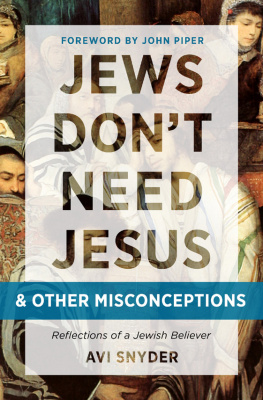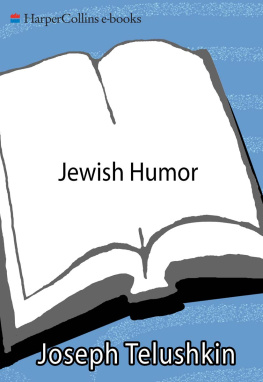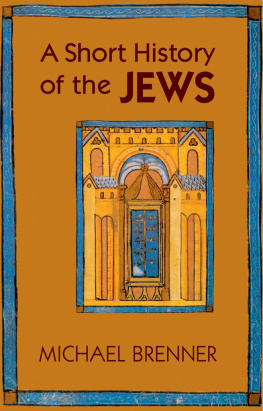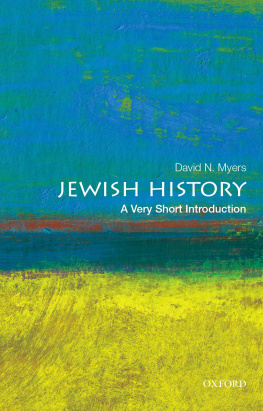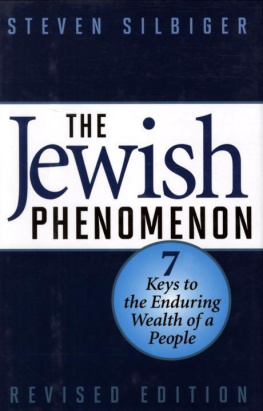jews and words
jews and words
AMOS OZ AND FANIA OZ-SALZBERGER
A companion volume to the Posen Library of Jewish Culture and Civilization

Copyright 2012 by Amos Oz and Fania Oz-Salzberger.
All rights reserved.
This book may not be reproduced, in whole or in part, including illustrations, in any form (beyond that copying permitted by Sections 107 and 108 of the U.S. Copyright Law and except by reviewers for the public press), without written permission from the publishers.
Yale University Press books may be purchased in quantity for educational, business, or promotional use. For information, please e-mail sales.press@yale.edu (U.S. office) or sales@yaleup.co.uk (U.K. office).
Designed by Sonia Shannon.
Set in Berkeley type by Keystone Typesetting, Inc.
Printed in the United States of America.
Oz, Amos.
Jews and words / Amos Oz and Fania Oz-Salzberger.
p. cm.
Includes index.
A companion volume to the Posen Library of Jewish Culture and Civilization. ISBN 978-0-300-15647-8 (cloth : alk. paper) 1. JewsIntellectual life. 2. JewsOrigin. 3. JewsHistory. 4. Bible. O.T.Criticism, interpretation, etc. 5. Hebrew literatureHistory and criticism. 6. JudaismHistory.
I. Oz-Salzberger, Fania. II. Title.
DS113.O98 2012
305.8924dc23 2012022077
A catalogue record for this book is available from the British Library.
This paper meets the requirements of ANSI/NISO Z39.48-1992 (Permanence of Paper).
10 9 8 7 6 5 4 3 2 1
How odd
Of God
To choose
The Jews.
William Norman Ewer
Not so odd: the Jews chose God.
Anon.
The Jews chose God and took his law
Or made God up, then legislated.
What did come first we may not know
But eons passed, and theyre still at it:
Enlisting reasoning, not awe,
And leaving nothing un-debated.
contents
ONE
Continuity
TWO
Vocal Women
THREE
Time and Timelessness
FOUR
Each Person Has a Name; or, Do Jews Need Judaism?
preface
This book is an essay. It is a nonfiction, speculative, raw, and occasionally playful attempt to say something a bit new on a topic of immense pedigree. We offer you our personal take on one core aspect of Jewish history: the relationship of Jews with words.
The authors are a father and a daughter. One is a writer and literary scholar, the other a historian. We have discussed and disputed topics relevant to this book ever since one of us was about three years old. Nevertheless, our coauthorship warrants some justification.
The best way to account for our teamwork is to spell up front what this essay says. It says that Jewish history and peoplehood form a unique continuum, which is neither ethnic nor political. To be sure, our history includes ethnic and political lineages, but they are not its prime arteries. Instead, the national and cultural genealogy of the Jews has always depended on the intergenerational transmittal of verbal content. It is about faith, of course, but even more effectively it is about texts. Significantly, the texts have long been available in writing. Tellingly, controversy was built into them from the very start. At its best, Jewish reverence has an irreverent edge. At its best, Jewish self-importance is tinged by self-examination, sometimes scathing, sometimes hilarious. While scholarship matters enormously, family matters even more. These two mainstays tend to overlap. Fathers, mothers, teachers. Sons, daughters, students. Text, question, dispute. We dont know about God, but Jewish continuity was always paved with words.
For this very reason, our history excels as a story. Indeed, several histories and numerous stories are intertwined in the annals of the Jews. Many scholars and writers have braved this maze. Here we are offering a joint walk through some its pathways, entwining the gazes of a novelist and a historian, and adding our own interlocution to its myriad conversing voices.
In this slender volume no attempt was made to run the gamut of Jewish works, even the best known or the most influential. There are numerous texts we have not read. The essayistic genre can deliver dense and panoramic discussions of vast topics, but it is also particularly prone to selective reading, personal bias, and an arrogant grope for generalization. Regardless of such generic faults, we take full responsibility for each of these shortcomings, and for many others the reader may encounter. Here is another thing our book tries to spell out: in Jewish tradition every reader is a proofreader, every student a critic, and every writer, including the Author of the universe, begs a great many questions.
If this set of suggestions is persuasive, then our joint father-and-daughter project might make sense.
acknowledgments
Naturally, the wisdom and advice of many people have flown into this small book, as has excellent criticism. Our first and foremost thanks go to our family: Nily Oz, Eli Salzberger, and Galia Oz gave this manuscript their sharp readings and shrewd comments; Daniel Oz, Dean Salzberger, and Nadav Salzberger took part in many a meaningful, gritty, and deeply enjoyable intergenerational conversation.
Felix Posen came up with the very idea for this project, and both he and his son Daniel offered unfailing friendship, dedication, and good cheer. It may not seem typical of two native Hebrew speakers like ourselves to engage with their own cultural legacies in English, but we feel that this book belongs squarely and intimately with the Posen Library of Jewish Culture and Civilization. Many fine scholars are at work on the Librarys ten volumes, and their work has inspired ours. We share the Librarys broad vision, which is by no means a narrow agenda, of Jewish history as a complex and multifarious trove of human voices crisscrossed by significant continuums. The wealth of cultural diversity does not trump the presence of unifying principles. Religion is but one of them.
Several colleagues and friends were kind enough to read and critique the manuscript. They saved us from factual mistakes, errors of judgment, and similar mishaps; those still remaining in the book are ours alone. Heartfelt thanks go to Yehuda Bauer, Menachem Brinker, Rachel Elior, Yosef Kaplan, Deborah Owen, Adina Stern, and an anonymous reader for Yale University Press.
Other intellectual debts, usually in the form of unforgettable exchanges or lectures heard over the years, are gratefully acknowledged. Some of the following persons may not know that they inspired this book, but inspire they did: Shlomo Avineri, Haim Beer, Susannah Heschel, Ora Limor, Anita Shapira, Daniel Statman, Yedidia Stern, Michael Walzer, and A. B. Yehoshua. Several volume editors in the Posen Library sent us relevant materials, and we are grateful again to Ora Limor and Yosef Kaplan, alongside David Roskies and Elisheva Carlebach.
Most of this book was written during Fania Oz-Salzbergers double tenure at the University of Haifa and at Monash Universitys Australian Centre for Jewish Civilisation, as the Leon Liberman Chair in Modern Israel Studies. Warm thanks go to Australian friends Lee Liberman, Les Reti, and Ricci Swart. It is likewise a pleasure to thank the Fellows, staff, and students of the University Center for Human Values, Princeton University, for a zesty year of intellectual adventure in 200910.
Sarah Miller and Dan Heaton of Yale University Press gave this book their subtle and perceptive editorial attention, for which we are particularly thankful. Joyce Rappaport and Yael Nakhon-Harel of the Posen Foundation kindly provided further editorial support. Tammy Reznik held the fort at Monash University. At the University of Haifa, Ela Bauer, Lee Maanit, Boaz Gur, and Alon Kol were of great help during various stages of research and writing; Kalanit Kleemers administrative support was invaluable.
Next page

